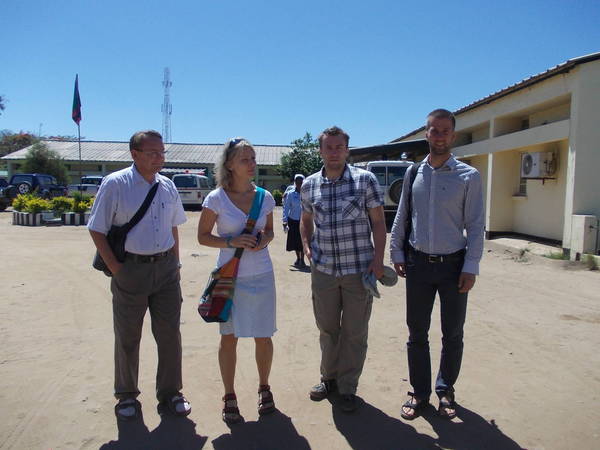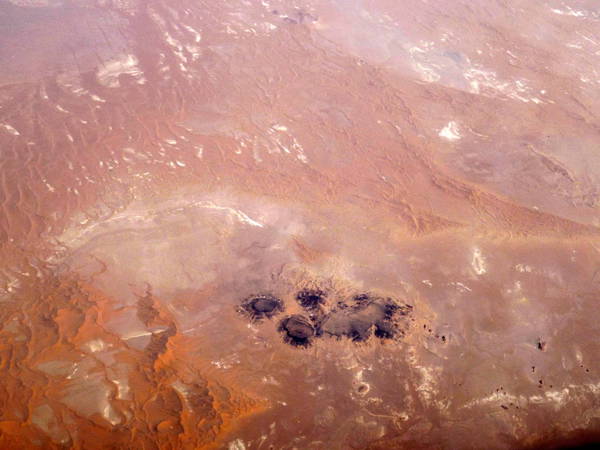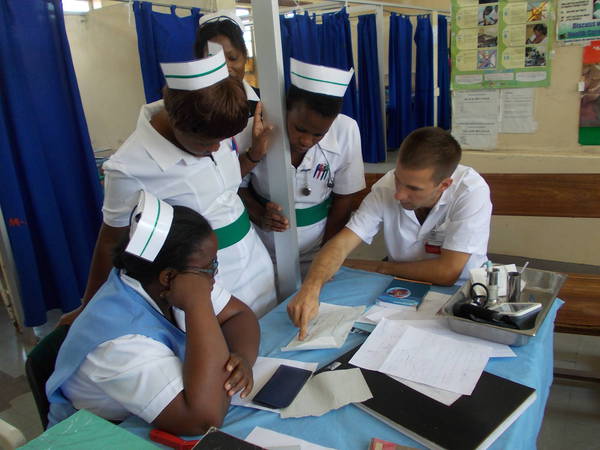A team of Czech experts in maternal and child healthcare were sent to Zambia by Caritas Czech Republic. The Czech doctors will spend one month passing on knowledge and their experiences with their Zambian colleagues.
One of the members of the medical team, Dr. Adam Neumann, shared his experiences and impressions.
To begin with, it is necessary to introduce the members of the Czech medical team, which will operate in Lewanika General Hospital and associate rural clinics (on the picture from the left side):
-
 Czech doctors team leader, MD Petr Šváb, head of the department of gynecology and obstetrics in Carlsbad Regional Hospital with thirteen years of operating praxis in Botswana
Czech doctors team leader, MD Petr Šváb, head of the department of gynecology and obstetrics in Carlsbad Regional Hospital with thirteen years of operating praxis in Botswana - Martina Šimůnková, pediatric nurse with experience in the neonatal intensive care unit in Podolí
- MD Adam Neumann, obstetrician-gynecologist of Gynaecology and Obstetrics in General Faculty Hospital with the experience from Jordan, who is participating in the project Caritas Zambia as a volunteer
- MD Jiří Halbrštát, a pediatric doctor from the Institute of Mother and Child Care in Prague-Podolí
Below, you can read the words of doctor Neumann
Our journey had started over a week ago, when the team successfully met at the airport in Prague and headed to Zambia. The transfer in Amsterdam went without any problem, perhaps we were surprised by a technological advancement of the local airport when only a device that scanned our passports was waiting for us instead of the immigration officials and everything was settled.
 The flight proceeded without problem. We saw the shores of Sicily and the first pieces of African land during the fligtht over Libya. Crossing over the Sahara revealed to us the incredible expanse of the largest desert in the world. One cannot understand it until one sees it. The flight to Lusaka was led through Harare, where the passengers exchanged and we could continue to our destination after one hour of waiting. At the airport of Lusaka, there was tea waiting for us (Ed. - Tea Tihounová, Head of Mission of Caritas Czech Republic in Zambia), who took care of our transportation from the airport and our accommodation, thus we avoided spending the night at the airport. The hotel was very good by the local standards, but the truth is that we were so tired that we would have been grateful for anything.
The flight proceeded without problem. We saw the shores of Sicily and the first pieces of African land during the fligtht over Libya. Crossing over the Sahara revealed to us the incredible expanse of the largest desert in the world. One cannot understand it until one sees it. The flight to Lusaka was led through Harare, where the passengers exchanged and we could continue to our destination after one hour of waiting. At the airport of Lusaka, there was tea waiting for us (Ed. - Tea Tihounová, Head of Mission of Caritas Czech Republic in Zambia), who took care of our transportation from the airport and our accommodation, thus we avoided spending the night at the airport. The hotel was very good by the local standards, but the truth is that we were so tired that we would have been grateful for anything.
We spent our first day in Zambia in Lusaka and part of it was spent travelling. In Lusaka we accompanied Martina to her interview at a local affiliate chamber, which was a prerequisite for obtaining authorization to work as a nurse in Zambia. Fortunately, this did not afflict her and we could leave after a 3-4 hours of waiting. We stopped for a meal and then went to the train station. The journey by bus took us 8 hours. Maybe only when crossing Zambia, for the first time, we realized that we actually were in Africa. Straw and mud huts, many children along the roads, dust and sun. Scenes from movies about travelling. Part of the journey led us also through the Kafue National Park. Unfortunately, we did not have much luck and did not bump into any elephants or giraffes – it is said that there are some, and we plane to check it out in two weeks during the weekend. We are going to a real safari, so perhaps our expectations will be fulfilled. We arrived at night to Mongu, so we just unpacked the essential things and went to sleep.
The very skilled director, Dr. Silumesii, welcomed us and guided us around all departments. After the tour, we parted with a plan to meet in the afternoon to arrange the ways of our cooperation. The time that we have gained, we used to visit one of the local supermarkets. In the afternoon, a meeting was held in a friendly spirit. We planned that we will schedule everything next week.
 Other days, in terms of workload, run, broadly speaking, according the same scenario. In the mornings we také part in reporting of what had happened overnight. Then we split up and go to our departments – Jirka and Martina to the Department of puerperium, where there are also newborns except mothers. Adam and Peter go mostly to the delivery room, where we join Dr. Matuwa and do ward rounds together. Sometimes we are asked for advice on gynaecology or in the ambulance. We often have the chance to see interesting cases and diseases in an advanced stage, that we could not even imagine in the Czech Republic.
Other days, in terms of workload, run, broadly speaking, according the same scenario. In the mornings we také part in reporting of what had happened overnight. Then we split up and go to our departments – Jirka and Martina to the Department of puerperium, where there are also newborns except mothers. Adam and Peter go mostly to the delivery room, where we join Dr. Matuwa and do ward rounds together. Sometimes we are asked for advice on gynaecology or in the ambulance. We often have the chance to see interesting cases and diseases in an advanced stage, that we could not even imagine in the Czech Republic.
The whole team agrees on several points. Equipment of the hospital is not bad at all. Already several years ago, the Czech Development Agency provided the hospital with devices, for example in the intensive care unit, infusion pumps or baby incubators. Nevertheless, no one knows how to use this equipment or the equipment was broken and the locals did not bother to arrange the reparation. Instead, the device is put aside and forgotten, which is of course is a faster solution than to bother with finding a repairman. On the other hand, this solution is very short-sighted. Thus, as a result, the hospital has facilities for hundreds of thousands of crowns, which is little used. Luckily, we managed to launch several devices during one week, and we started with the training of the staff showing them how to use each device. It makes them happy, mainly nurses, as they understand that it improves patient care and can make their jobs easier.
 Sometimes it is a problem for them to listen to our advice in a rather lukewarm way, at least for now. It is probably due to slight distrust and the feeling that we actually do not know how things are in Africa and that they already know everything they need to know. From the beginning it was frustrating, but every day we manage to promote small but useful advice and techniques, so there is a hope that at the end of our stay, the local staff will learn something from our efforts.
Sometimes it is a problem for them to listen to our advice in a rather lukewarm way, at least for now. It is probably due to slight distrust and the feeling that we actually do not know how things are in Africa and that they already know everything they need to know. From the beginning it was frustrating, but every day we manage to promote small but useful advice and techniques, so there is a hope that at the end of our stay, the local staff will learn something from our efforts.
Of course, it is too early to assess the whole operation. For now, we have a good feeling about our work we have done here. Everything has advanced somehow. For example, we started with morning seminars, which are met with a good response. The staff knows us better now and trusts us more. We attend births, operations and various check-ups. Finally, we managed to agree on the menu for the week, which we follow quite precisely, so the process of eating is more efficient now.
 There is a lot to do here. Every day is full of big and small adventures and many meetings. As the time goes on this page you can read our fates and insights.
There is a lot to do here. Every day is full of big and small adventures and many meetings. As the time goes on this page you can read our fates and insights.
The Czech medical team went to Zambia due to the project improving quality and access to maternal and child healthcare in Western Province, Zambia, which is financed by the Czech Development Agency.
More pictures from the first day of the Czech medical team’s journey in Zambia can be found in the photo-gallery Early experiences from Zambia.






